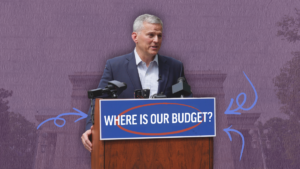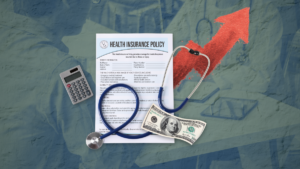Source: Associated Press
Funding North Carolina public schools, addressing affordable housing, increasing salaries for educators and state employees, are just a few of the many recommendations unveiled in Gov. Roy Cooper’s proposed state budget for the 2022-23 fiscal year, according to the Associated Press.
Cooper’s proposed budget maps out a plan to build on the “state’s success” by centering investing towards North Carolina families, businesses, and communities.
“Families have returned to their lives of work and school after tremendous challenges but find that they still struggle to find affordable healthcare and childcare,” said Cooper in a press release. “North Carolina is emerging from the pandemic stronger than before, and we will sustain that only if we invest in a strong foundation for our people: A quality education, good jobs and infrastructure, and access to affordable healthcare. Let’s use this historic opportunity to give families, businesses and communities the tools they need to thrive.”
Here’s a brief look at a few of the highlights surrounding Cooper’s proposal:
- The governor is recommending a five percent raise for the state’s educators and state employees. In addition, school administrators and teachers would receive a proposed $3,000 total bonus.
- In an effort to ensure every child has access to a sound, basic education and highly qualified teacher in the classrooms, Cooper is recommending investments towards the Leandro comprehensive remedial plan, expanding access to early childhood education.
- The governor is also recommending funding K-12 and University of North Carolina system construction projects, repairs and renovations.
- The budget expands affordable housing – giving assistance to first-time homebuyers who make less than the state’s median income, and enhanced assistance for educators, law enforcement, firefighters, and EMS personnel.
Clean energy initiatives, expanded job opportunities, increasing the minimum wage for state workers and Medicaid expansion are several other investment areas recommended by the governor in his latest state budget.
Educators have praised the governor’s latest budget for its focus on tackling education inequalities and addressing long-standing needs.
“Gov. Cooper’s proposal communicates in no uncertain terms that the well-being and prosperity of our students, educators, schools and communities will be a focus for this administration during the coming budget negotiations,” said Tamika Walker Kelly, president of the North Carolina Association of Educators, in a statement. “Following the unprecedented challenges educators faced over the last few years, we’re grateful to see Gov. Cooper propose these needed investments in our education system. For too long, educators in our state have been forced to make do with too little, and we’re encouraged to see Gov. Cooper attempting to right those wrongs.”
Read more about Cooper’s full budget recommendations here.




